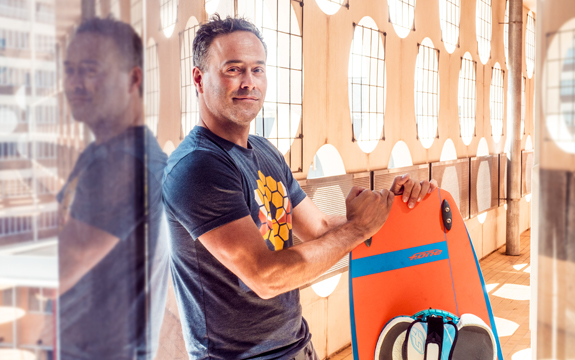Surfing, stars and science sway Swinburne’s newest astronomer

In Summary
- Astronomer, Ivo Labbe, joins Swinburne’s Centre for Astrophysics and Supercomputing from Leiden University in the Netherlands
- He talks to Swinburne News about his love of the stars and of the surf
By his own admission, Ivo Labbe is an accidental astronomer.
In fact, the newest member of Swinburne’s internationally renowned Centre for Astrophysics and Supercomputing (CAS) says it was more his passion for surfing than the stars that saw him tumble into the field.
“My PhD adviser was very clever,” the Dutch-born researcher says of how he entered the realm of astronomy.
“He took me aside and told me he had a PhD position going in astronomy and astrophysics but that it meant traveling to Hawaii.
“He knew I loved surfing and wouldn’t be able to say no. He was right.”
Since, Associate Professor Labbe has traversed Europe and the US becoming an international leader in the study of distant universes with one eye firmly fixed on the stars and the other on the surf.
He says while the reputation of CAS and its people were the main reasons behind his move from Leiden University in the Netherlands to Melbourne, it was Swinburne’s closeness to the Australian surfing meccas of Bells Beach and Torquay that sealed the deal.
“Can I surf there? Yes, tick,” he says of his final decision to move to Melbourne.
“My colleagues in the Netherlands were very jealous. Mainly about the weather.”
Big telescopes
Associate Professor Labbe’s expertise – other than surfing - is in big telescopes. As in `Hubble Telescope’ big.
“My particular field, the thing I do, is use the most powerful telescopes in the world – like the Hubble Telescope - to make pictures of the distant universe,” he explains.
“The reason why I look at very distant objects is that light from very far away takes a long time to get here and so you are basically looking at things as they were, in the past.
“My expertise is to take that to the extreme and go all the way back to the beginning of time essentially to try and see the first galaxies form in the universe. Ultimately we hope to see the first stars form.”
World record for distant galaxy discovery
He was part of the international team that famously holds the world record for discovering the most distant galaxy ever observed at 13.4 billion light years away.
“So that’s looking 13.4 billion years into the past and the universe is 13.8 billion years old today. So, we’re only talking about a few hundred million years after the big bang,” he says.
When asked if he thinks the first ever galaxies have yet to be observed, he is circumspect.
“Galaxies were very different. They were very young, very small and very bright because they were bursting with activity. We really don’t understand what they are and what’s in them,” he says.
“We don’t know whether we have seen the first galaxy. There’s no flagpole in a galaxy saying “Hey, I’m the first”. So we have to deduce all these things. And it’s very hard because we are working with pictures and the pictures are fuzzy blobs.
“So based on the colour and light of the fuzzy blob, we try to deduce all these things – how many stars are in there, how far away it is etc.”
Hubble replacement to help unlock distant galaxies
He says he’s particularly excited about next year’s launch of the Hubble Telescope’s replacement, the $8 billion James Webb Space Telescope.
Due to go online in 2020, the James Webb will have far more sophisticated and sensitive instruments than the Hubble and Associate Professor Labbe is hoping it will help unlock some of the secrets of the distant galaxies.
“It has all these sensitive instruments which will allow you to dissect the light. So rather than just having pictures of fuzzy blobs, we can see what is generating the light and how old the stars are,” he says.
“This will help us determine whether these galaxies are a first or not.”
While at Swinburne, Associate Professor Labbe will use his connections across the globe to organise international research teams and help raise the profile of CAS.
Swinburne’s commitment to astronomy
He says he was drawn to Swinburne because of its well-known investment in astronomy and astrophysics and its commitment to providing researchers expensive access to big telescopes.
“Swinburne is really exciting because it’s still a young university but it’s punching above its weight, especially in astrophysics. It’s very exciting,” he says.
“Also, the scientific climate in Australia is very good.
“Australia is a country that really invests in academia still. In other countries, this has slacked a little bit. In the US, academia is a little bit under siege. Even in Europe, the academic market is tough.
“In Australia, the academic climate is really positive, well-funded, with lots of opportunities.”
He’s only been here a month but Associate Professor Labbe says his time in Australia has “been a blast”.
And while he has managed to secure a place to live, his already busy schedule has meant that he has only so far managed to buy a bed, a fridge and washing machine. He’s even been too busy to look for a new surfboard

